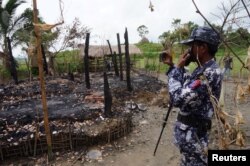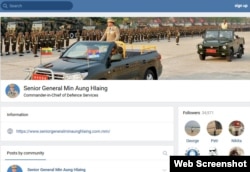The decision by Facebook to ban senior military figures from using its platform has opened a debate in the country, with some calling it an attack on freedom of expression, and others praising the social media giant for finally taking the kind of firm action that rights activists have long demanded.
Last month, Facebook banned senior figures from Myanmar’s military, including army chief Senior General Min Aung Hlaing, after a United Nations investigation recommended that they face a trial for genocide following last year’s brutal military crackdown in Rakhine State.
In a statement, Facebook said it had removed 46 pages and 12 accounts for “engaging in coordinated inauthentic behavior” on the social media platform. It said it wanted to “prevent them from using our service to further inflame ethnic and religious tensions”.
The announcement was made shortly after the U.N. Fact-Finding Mission on Myanmar called for a genocidal probe into Min Aung Hlaing and five other army commanders following its campaign in northern Rakhine State last year, which saw an estimated 700,000 mainly Rohingya flee into Bangladesh.
A Facebook spokesperson told VOA via email that an investigation was conducted independently by the company and “not in cooperation with any government or non-government organization”.
“We have a responsibility to fight abuse on our products,” the company official said. “This is especially true in countries like Myanmar where many people are using the Internet for the first time, and Facebook can be used to spread hate and incite violence.”
In a concession to critics who have accused the company of waiting too long to take action, the spokesperson said Facebook had been “too slow to spot” hate speech on its platform, adding that the ban was permanent.
Some Internet users in Myanmar have criticized the decision, saying it prevents the military from spreading otherwise legitimate information. After the announcement, government spokesperson Zaw Htay told reporters the government would raise the ban with Facebook directly.
Marzuki Darusman, chairperson of the Fact-Finding Mission on Myanmar, told VOA that he welcomed Facebook's decision.
“It gives us great assurances that Facebook as a platform can play a very important role in restoring confidence within the country,” he said. “Confidence in technology and facts, confidence in understanding the motivation of the government in their policies, and confidence within the community that communication and interaction is gradually restored on the basis of trust.”
Rise of hate speech
Widespread Internet use is new to Myanmar, formerly known as Burma. In 2014, two international telecom operators – Qatar-based Ooredoo and Norway's Telenor – entered the market, ending a monopoly held by the state-run Myanmar Posts and Telecommunications. Overnight, the price of a SIM card fell from more than $250 to $1.50, bringing most of the population online for the first time. According to Telenor company officials, Myanmar now has a 105 percent SIM card and 80 percent smartphone penetration rate, up from less than 10 percent before the market was liberalized.
Facebook quickly and overwhelmingly emerged as the most popular platform, accounting for more than 85 percent of all Internet traffic, according to local research group Consult Myanmar.
But critics charge that the California-based company's service has also served as a platform for unsubstantiated rumors that have contributed to some of the violence that has plagued the country in recent years. In 2014, rumors spread on Facebook that a Buddhist woman in Mandalay was raped by her Muslim employer. In the riots that followed, at least two people were killed.
Despite Facebook's latest actions, online hate speech remains an issue in Myanmar. In an investigation published in August, Reuters news agency said it had found more than 1,000 examples of posts, comments and pornographic images on Facebook that were attacking the Rohingya minority and other members of the country's Muslim population.
Aung Kaung Myat, a blogger who monitors online misinformation in Myanmar, said that before Facebook banned Min Aung Hlaing, nationalists would use the social media page to spread pro-military messages and posts attacking State Counsellor Aung San Suu Kyi and her party, the National League for Democracy.
“Their posts were obviously targeted towards Muslims,” Aung Kaung Myat told VOA, adding that doctored images often depicted Aung San Suu Kyi wearing a hijab. “Their intentions are clearly different to those of other Facebook users,” he said.
He added that when Facebook announced its ban, many of these users moved their profiles to VK, a Russian social media platform that claims to have more than 500 million subscribers.
Less than 48 hours after the Facebook ban, a page for General Min Aung Hlaing was established on VK. The page, which has daily updates in Myanmar and English, now has almost 35,000 followers.
Aung Kaung Myat said one prominent nationalist regularly posted updates with terms that are derogatory for people of South Asian descent.
“I think they were probably testing what was and wasn’t allowed on the page,” said Aung Kaung Myat. “These nationalists want a platform where they are able to post their hate messages freely.”










